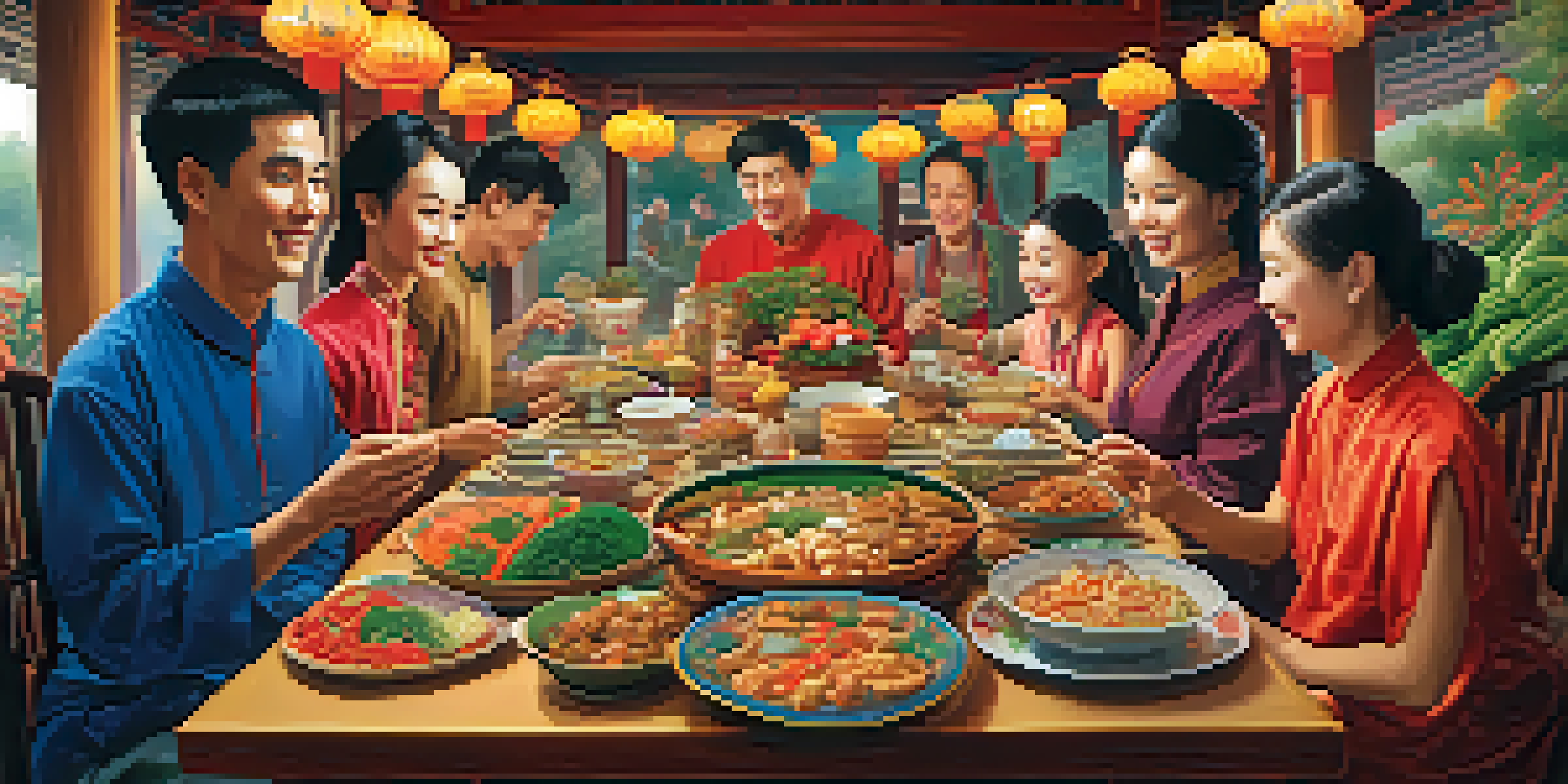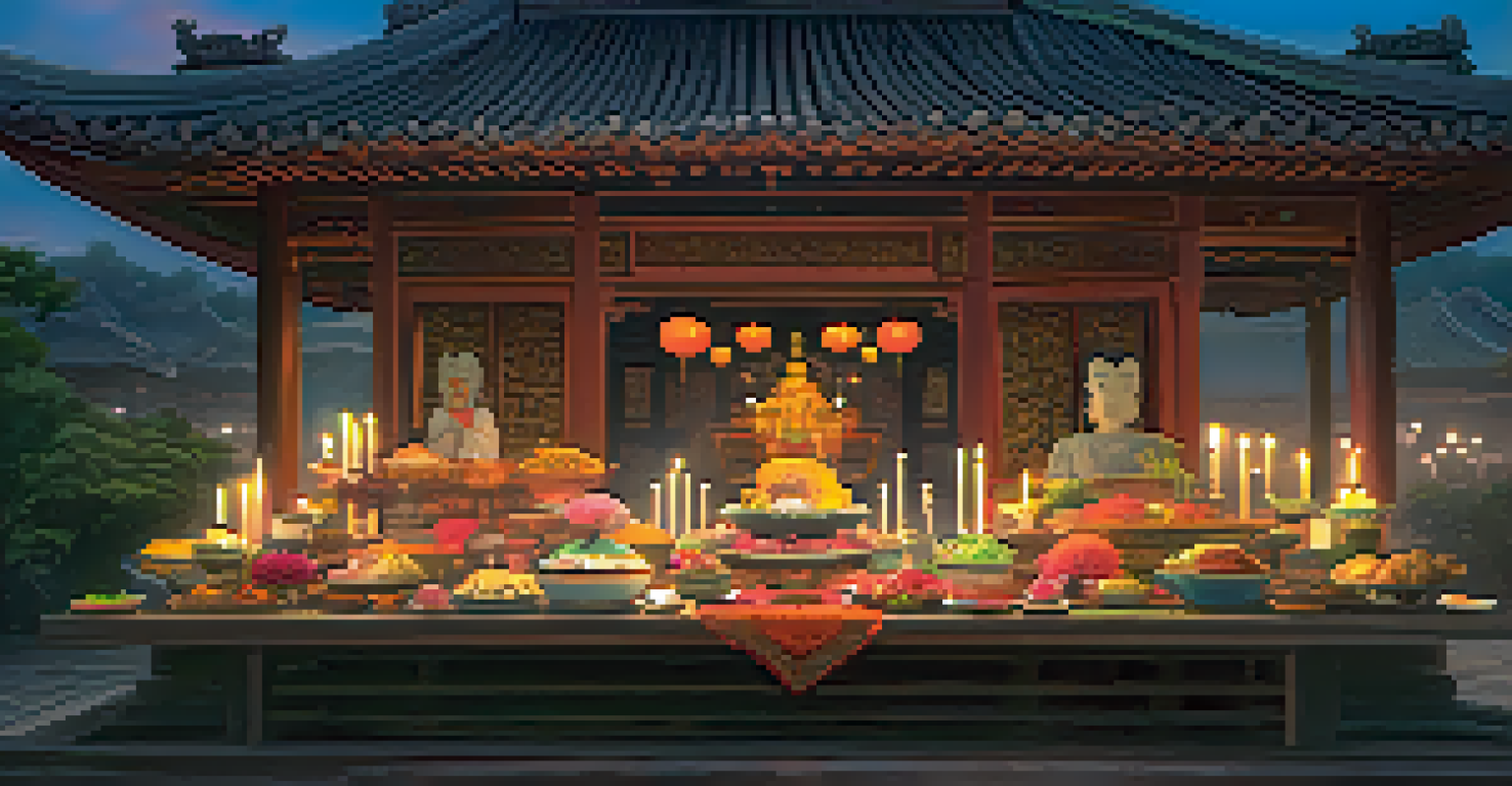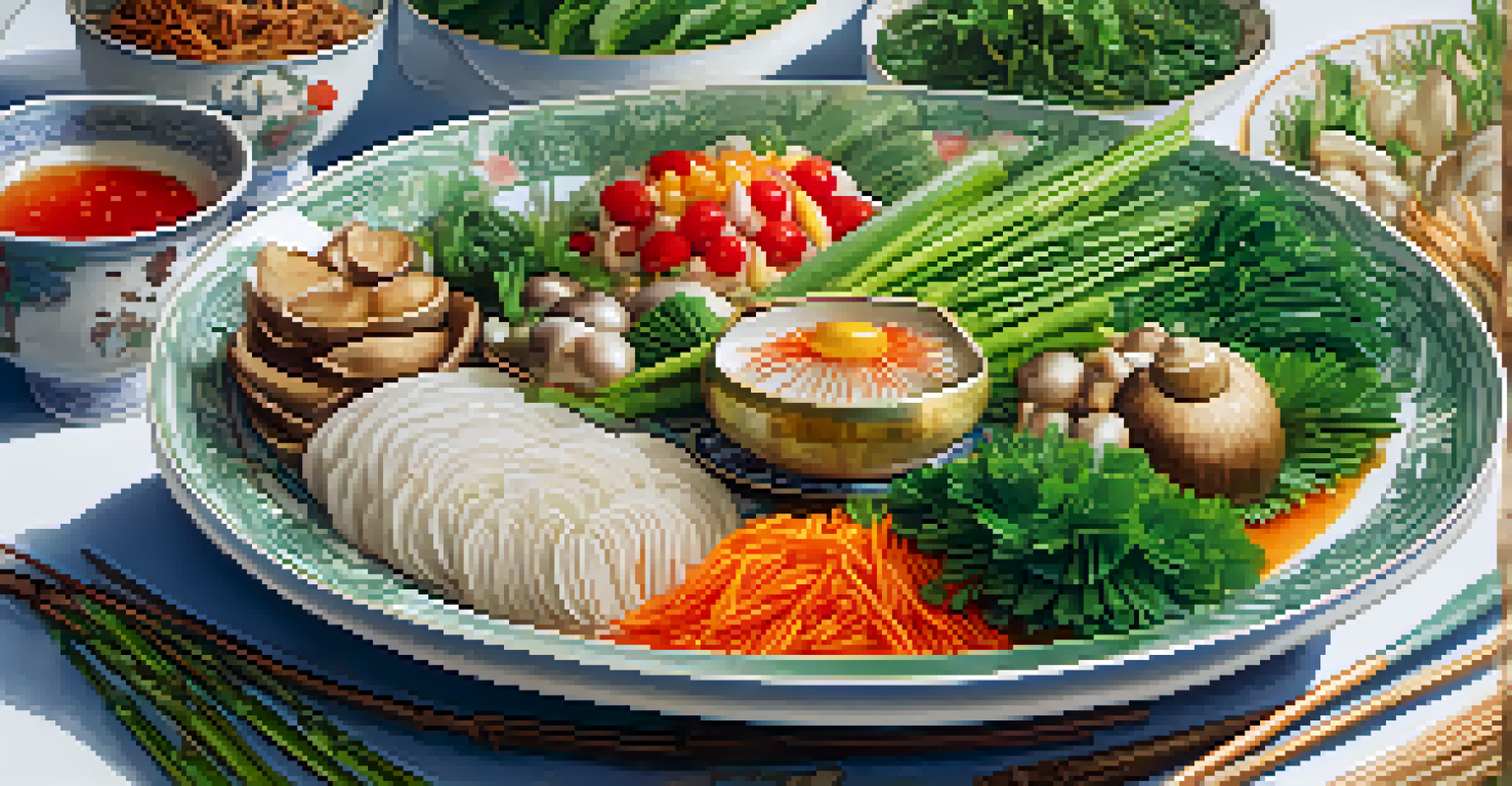Vegetarianism in Chinese Festivals: Cultural Significance

Understanding Vegetarianism in Chinese Culture
Vegetarianism in Chinese culture is deeply rooted in philosophy and religion. Many Chinese people adopt vegetarian diets out of respect for life, influenced by beliefs in Buddhism and Taoism. These traditions encourage compassion and the idea that all living beings have their own purpose and place in the world.
The food you eat can either be the safest and most powerful form of medicine or the slowest form of poison.
In Chinese society, vegetarianism is not just about food choices; it's a way to foster mindfulness and spiritual growth. During religious observances, many participants choose vegetarian meals to purify themselves and cultivate a deeper connection with their faith. This practice serves as a reminder of the greater purpose behind their actions.
Moreover, the connection between food and cultural identity runs deep in China. Celebrating vegetarianism during festivals highlights a community's shared values and traditions, reinforcing bonds among family and friends while honoring ancestral practices.
The Role of Vegetarianism in Major Chinese Festivals
Several Chinese festivals prominently feature vegetarianism, showcasing its cultural significance. For instance, the Qingming Festival, also known as Tomb-Sweeping Day, sees many people offering vegetarian dishes at their ancestors' graves. This act symbolizes respect and remembrance, emphasizing the importance of honoring those who came before us.

Another notable festival is the Ghost Festival, where many Chinese people prepare vegetarian meals to appease wandering spirits. By avoiding meat, they believe they can create a peaceful atmosphere and show compassion towards these spirits. This practice underlines the connection between food, spirituality, and respect for the deceased.
Cultural Roots of Vegetarianism
Vegetarianism in Chinese culture is deeply influenced by philosophical and religious beliefs, promoting compassion and respect for all living beings.
The Vegetarian Festival, celebrated mainly in Southeast Asia, primarily among Chinese communities, is another example. During this event, participants adhere to a strict vegetarian diet for nine days, engaging in various rituals and ceremonies. This festival not only highlights dietary practices but also fosters a sense of community and shared beliefs.
Symbolism of Vegetarian Dishes in Festivals
In Chinese festivals, vegetarian dishes often carry deep symbolic meanings. For example, vegetables like mushrooms and bamboo shoots are commonly used due to their association with growth and prosperity. These ingredients serve as reminders of the blessings and abundance that nature provides, aligning with the festival's themes of gratitude and renewal.
Eating is an agricultural act.
Additionally, certain vegetarian dishes represent harmony and balance, which are essential principles in Chinese philosophy. A typical festival meal might include a variety of colors and textures, symbolizing the balance between yin and yang. This harmony extends beyond just the food; it reflects the values of the family and community coming together.
Moreover, the act of preparing and sharing these vegetarian meals strengthens social bonds. Families gather to cook traditional dishes, passing down recipes and stories through generations. This communal aspect enhances the festival experience and reinforces cultural identity.
Regional Variations of Vegetarianism in Festivals
Vegetarianism during Chinese festivals varies significantly across regions, reflecting local customs and beliefs. In southern China, for instance, the practice is often more prevalent, with elaborate vegetarian feasts being a central theme during celebrations. In contrast, northern regions may incorporate fewer vegetarian options, highlighting local agricultural practices.
Each region boasts unique vegetarian dishes that showcase local ingredients and culinary techniques. For example, in Sichuan, spicy vegetarian dishes are favored, while in Cantonese cuisine, delicate flavors and textures take center stage. These regional variations add richness to the overall festival experience.
Festivals Celebrate Vegetarianism
Chinese festivals prominently feature vegetarian dishes, symbolizing respect for ancestors and spiritual connections during observances.
These differences also illustrate the adaptability of vegetarianism within Chinese culture. As communities evolve and intermingle, they share practices and ingredients, leading to innovative vegetarian dishes that honor tradition while reflecting modern tastes.
Health and Environmental Aspects of Vegetarianism
In recent years, there's been a growing awareness of the health benefits associated with vegetarianism, especially during festivals. Many Chinese families view these celebrations as opportunities to reset their eating habits and embrace healthier lifestyles. With an abundance of seasonal vegetables available during festivals, it's easier to prepare nutritious meals.
Additionally, the environmental impact of vegetarianism is becoming a significant topic of discussion. By choosing plant-based options, individuals contribute to sustainability efforts, which is increasingly important in today’s world. Many festival-goers are motivated by the desire to reduce their carbon footprint, making mindful food choices that align with their values.
This shift towards vegetarianism during festivals reflects a broader cultural change, where traditional practices meet modern consciousness. As more people seek to balance their love for food with a commitment to health and the environment, vegetarianism is likely to remain a prominent feature in future celebrations.
Modern Adaptations of Vegetarianism in Chinese Festivals
As society evolves, so does the approach to vegetarianism in Chinese festivals. Younger generations are increasingly experimenting with vegetarian dishes, incorporating global influences and modern cooking techniques. This fusion of flavors not only keeps traditions alive but also makes them more accessible and appealing to a wider audience.
Moreover, the rise of plant-based alternatives has transformed the way people celebrate festivals. With the availability of meat substitutes, such as tofu and seitan, many are able to enjoy familiar flavors without sacrificing their dietary choices. This evolution highlights how traditions can adapt while maintaining their core values.
Modern Adaptations of Tradition
Younger generations are creatively integrating global influences into traditional vegetarian practices, making them more accessible and appealing.
Social media also plays a significant role in promoting vegetarianism during festivals. Influencers and food bloggers showcase innovative vegetarian recipes, encouraging others to explore this lifestyle. This trend fosters a sense of community and shared experiences, making vegetarianism a vibrant part of modern Chinese culture.
Conclusion: Embracing Vegetarianism in Festivals
Vegetarianism during Chinese festivals is more than just a dietary choice; it’s a profound cultural practice that connects generations. By embracing vegetarian dishes, families honor their heritage while fostering a sense of community and respect for life. These celebrations serve as a reminder of the importance of compassion and mindfulness in our daily lives.
As we navigate the complexities of modern living, the role of vegetarianism in festivals offers valuable lessons on sustainability, health, and spirituality. By understanding these practices, we can appreciate the deeper meanings behind the food we share during celebrations.

Ultimately, the continued evolution of vegetarianism in Chinese festivals reflects the dynamic nature of culture itself. As traditions blend with contemporary values, they create a rich tapestry of experiences that resonate with people of all backgrounds, reminding us of the power of food to bring us together.